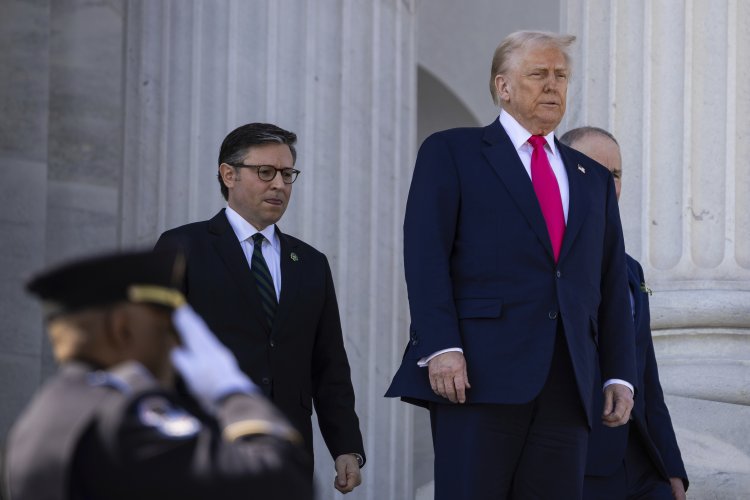Trump Is Becoming a Major Roadblock to the GOP's Plan to Fund His Agenda
House Republicans are looking to significant reductions in the safety-net health program to fund their major legislation. However, the president has strong reservations about this approach.

House Speaker Mike Johnson and other Republican leaders are focusing on a framework that would reduce parts of the Medicaid expansion initiated during President Barack Obama's administration. This move could yield hundreds of billions in savings to support Trump's broader legislative agenda, which includes substantial tax reductions, border security, and defense spending.
However, Trump has agreed to go after waste, fraud, and abuse within the program but remains cautious about any proposals that might be perceived as “cuts” to a health initiative he has repeatedly promised to safeguard. Following the political fallout from his unsuccessful attempt to repeal components of the Affordable Care Act in 2017, Trump has voiced discomfort with some of the ideas circulating among lawmakers during several recent discussions.
“Trump is definitely not convinced on reductions in Medicaid spending,” said one outside adviser, who requested anonymity to discuss the high-level talks. “His own instincts are that politically it’s not good, and Trump’s political instincts are pretty good.”
The conflict is expected to come to a head in the coming days when senior House Republicans will present Trump with various potential changes to Medicaid, along with estimates of their financial implications and effects on beneficiaries. It’ll be up to Trump to determine which proposals he finds acceptable.
Among the proposals that the White House is willing to evaluate—though not guaranteed to accept—is a contentious idea some House Republicans favor, which would cap the federal Medicaid allotment to states. At the same time, the Trump administration is pushing for initiatives that would lower drug costs by implementing a “most favored nation” policy that ties certain government payments for pharmaceuticals to the lower prices available internationally.
While Trump advocated for the drug pricing plan during his first term, he faced significant resistance from Republican lawmakers and the pharmaceutical sector. “Nobody’s losing coverage under that scenario,” a White House official said, adding, “The question is: are they willing to fight the pharma companies? I guess we’ll find out. We’re willing to fight.”
The upcoming decision from the president comes after Johnson's vigorous attempts to persuade Trump of the benefits of targeting the Medicaid expansion from the Obama era. With a self-imposed Memorial Day deadline looming, House Republicans are rapidly organizing a comprehensive legislative package, and the Energy and Commerce Committee aims to release the Medicaid section’s text by Monday.
Some within the GOP believe that deep cuts to Medicaid and other politically sensitive programs are crucial to balance the financial math of the extensive bill. Nevertheless, Trump is not convinced that such trade-offs are necessary. “He’s telling his advisers … ‘I know that everyone’s telling us we’ve got to do this, but I don’t know, I’m not so sure about this,’” the outside adviser noted.
The political tension has been compounded by repeated statements from Trump and his administration that Medicaid will not face cuts. Instead, they have spotlighted efforts to target waste, fraud, and abuse, as well as to exclude ineligible recipients, including undocumented immigrants.
In a New York Post article published Wednesday, chief of staff Susie Wiles asserted that Trump would achieve his agenda “without any cuts” to Medicaid.
Johnson has been actively working to garner Trump’s support, frequently traveling to communicate with him and maintaining daily contact to ensure alignment on their legislative strategy, as described by two Republicans who spoke on condition of anonymity.
Johnson has conveyed that one factor in the failure of the 2017 ACA repeal was a disconnect between Hill Republicans and Trump, and he has committed to avoiding a repeat of that situation by keeping Trump informed about challenging policy discussions and consistently gauging his preferences.
His team has also maintained regular communication with Vice President JD Vance and key aides, including Wiles and deputy chiefs of staff Stephen Miller and James Blair.
This coordination appears to be yielding results. During a rally in Michigan on Tuesday night, Trump presented a more nuanced commitment regarding Medicaid that seemed to allow for potential changes, as long as they do not affect the most vulnerable beneficiaries.
“We want to preserve Medicaid for the most vulnerable, for our kids, our pregnant women, the poor and disabled,” he stated.
This message aligns closely with Johnson’s messaging strategy, which echoes themes disseminated by the speaker’s office. Johnson reiterated similar sentiments during an Axios event on Wednesday, emphasizing the aim to “preserve the programs for the people who are genuinely in need and deserve it.”
The wording of the GOP’s Medicaid commitments is of great importance. Almost all Republicans—including the president—support the introduction of federal work requirements for able-bodied adults without dependents and efforts to eliminate waste, fraud, and abuse. These adjustments, they assert, can generate savings without constituting the “cuts” Trump has pledged to avoid.
“If you listen to everybody: Donald Trump, JD Vance, Dr. [Mehmet] Oz, even Elon Musk, it’s ‘We’re not cutting Medicaid,’” remarked Jim McLaughlin, a Trump campaign pollster. “We’re going to stop giving this to dead people. We’re going to stop giving it to foreigners and people that are in this country illegally. And we actually should be able to hopefully increase services and benefits to people that are truly in need, like pregnant mothers, disabled and low-income folks.”
However, limiting policy changes to those areas is likely to result in only modest savings. Rep. Nick LaLota indicated on Wednesday that Republicans could achieve $370 billion in savings through work requirements, removing noncitizens from benefit rolls, and conducting more regular eligibility checks—short of the $600 billion that House leaders are targeting.
The critical issue is which additional cuts Republicans will consider pursuing to achieve the necessary savings, an area where the situation becomes complex.
Johnson is trying to find a compromise by framing the issue of eliminating waste within the context of Trump’s no-cuts mandate, which he interprets as primarily applying to traditional, low-income recipients. This interpretation may allow for adjustments to the ACA expansion, which requires states to widen coverage to nearly all adults with incomes up to 138 percent of the poverty level, with the federal government covering 90 percent of the costs. A recent Supreme Court ruling made this expansion optional.
To date, 40 states and the District of Columbia have expanded Medicaid, adding coverage for approximately 20 million more Americans, thereby complicating any efforts to dismantle this safety net politically.
Despite these challenges, senior House Republicans are exploring various options as they search for the necessary savings. One proposal that aimed to reduce the federal cost share for the expansion population is no longer considered viable and will not be presented to Trump. However, “per capita caps,” which would limit the overall federal contribution to states, remains a possibility.
Some fiscal conservatives within the House are advocating for more drastic cuts and are worried that the Energy and Commerce Committee seems to be easing its approach. “The committee seems to want to rely on shell games,” remarked one Republican with knowledge of the discussions, who warned that merely instituting work requirements could inadvertently increase Medicaid spending by potentially prompting some of the 10 non-expansion states to join the ACA program.
“Is that really the legacy Republicans want?” the individual questioned.
A significant political challenge for the GOP is that Democrats are poised to revisit their 2017 strategy and criticize them for cuts to healthcare, a reality they are acutely aware of. Estimates indicate that some proposals being considered could eliminate coverage for up to 10 million Medicaid enrollees, and that’s not even accounting for more drastic options Republicans have contemplated.
To counteract these anticipated attacks, Republicans are contemplating using some of the savings from scaling back the ACA expansion to “reinvest” in benefits for “core” beneficiaries, including low-income pregnant women, children, and individuals with disabilities, multiple GOP officials on Capitol Hill have revealed.
“[Republicans] are being stung by these ads about how you’re going to hurt rural health, hurt women, and hurt pregnant women,” stated Stephen Moore, an economic adviser to the president. “But the whole message is: We’re not cutting anybody’s benefits. If anything, it’s talking about providing more and better benefits.”
Ian Smith for TROIB News












